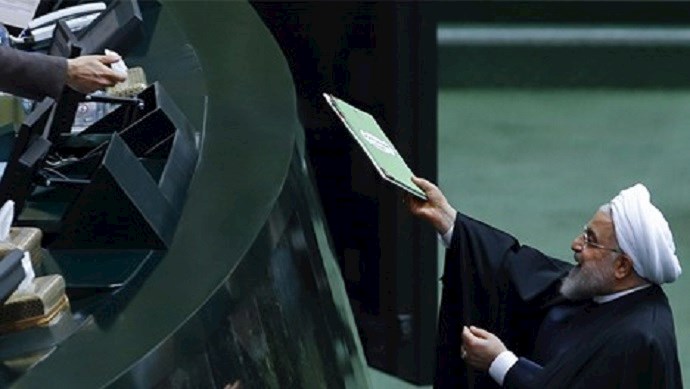Analyzing by PMOI/MEK
Iran, March 15, 2021—The Iranian regime’ is yet facing another crisis. After months of struggles, the 2021 budget was approved by the Majlis (parliament), only to be rejected by the Guardian Council with 60 objections.
The head of the regime’s central bank, Abdolnasser Hemati, desperately announced that the amendments to the budget will only cause more inflation and an increase in liquidity.
“The head of the central bank believes the approved budget figures will result in strong growth of printing money and liquidity,” the state-run Eghtesad News, March 7.
In an Instagram post, Hemati also acknowledged, “Ultimately, all different governments, despite critics, agree to budgets with high liquidity and inflation growth.”
“A 74-percent increase in next year’s budget has thwarted all of the central bank’s efforts to control inflation and will only cause more inflation next year,” an economist told the Shahr-e Khabar website on March 10.
Another regime economist said that the 2021 budget had forced the Central Bank to inject rials into the market to prevent a recession. “Next year, the Central Bank will be forced to take steps to deal with the budget deficit, which will further exacerbate inflation,” this economist said, according to a March 8 report by the Tasnim News Agency.
Even regime’s Chamber of Commerce is showing concern for the future of Iran’s economy and the next years’ budget. “The 2021 budget will only cause more inflation and the increase of currency,” declared the head of Tehran’s Chamber of Commerce.
The head of Tehran’s Chamber of Commerce also acknowledged, “2020 was the worst year in terms of public confidence in the country’s economic policies. The GDP growth between March and December 2020 was an average of 1.2 percent negative. We have a difficult path to achieve GDP growth of 2017, since it has been negative over the past two years.”
The regime has based the 2021 budget on selling 2.3 billion barrels of oil per day. This is while in the past year, it was not able to sell more than 700,000 barrels per day, and even that was done through smuggling channels and at prices that are lower than the market’s.
The government of Hassan Rouhani intends to earn 2,500 trillion rials (approx. $60 billion in official exchange rate) from the sale of 2.3 million barrels per day. This is twice the oil sales registered in the 2020 budget. This is while there’s no clear sign when international sanctions against the regime’s oil industry will be lifted. And the oil markets have been hugely disrupted by the coronavirus pandemic.
Rouhani’s government also based part of its budget on 2,500 trillion rials of tax. This is while many manufacturing enterprises are at the point of bankruptcy and recession. Many workers haven’t receive their wages or are unemployed. Previously the regime has announced that the GDP growth has decreased by 5.4 and the year before with 6.5 percent. This is while in 2017 the official inflation rate was above 30 percent.
The result of these statistics is a huge budget deficit. According to the estimates of the Parliamentary Research Center, the government has 2,000 trillion rials of cash deficit.
The disastrous economic situation is the result of the regime’s political impasse. The regime tries at any cost to maintain its establishment and make its forces believe it is stable. But the numerous contradictions within the regime on the 2021 budget deficit portray an unsolvable crisis.





